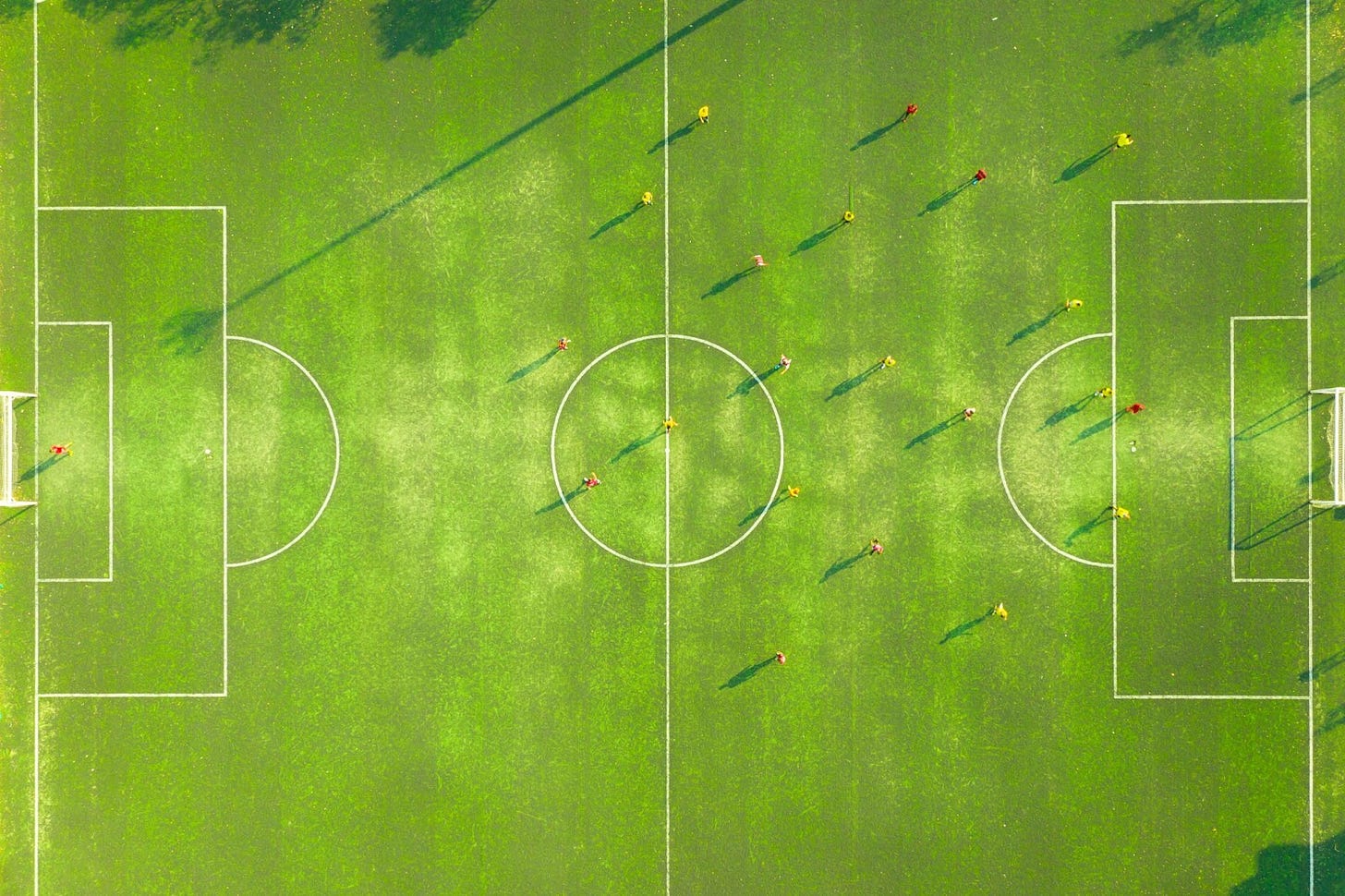In my final year of varsity soccer, I experienced two major injuries that kept me on the sidelines for most of the season.
First, I dislocated my knee. It happened during practice, and it was as painful as it sounds. I was sprinting toward the ball, winding up to shoot, and moved my leg in a way that made my kneecap go — pop! — right out of the socket. I was given painkillers and a knee brace, benched for a couple months.
With just a few games left, I was finally cleared to return — and promptly got injured again. This time, I tore my hamstring. Same leg. Oops. And ouch.
I was sent to physical therapy, where I slowly healed and strengthened my beat-up leg. I missed the rest of the season. The last game I played — the final one of my soccer career — was an all-star, post-season scrimmage for graduating seniors across the county. I don’t remember much about it, except that I felt like an injured racehorse, limping along, trotting back out more for spectacle than sport.
Over the past few weeks, I’d been hurtling toward a self-imposed deadline to finish the second draft of my manuscript. I revised at an intense pace, cramming in edits whenever (and wherever) I could to hit my goal. At the same time, I’d shared the first draft with a friend who asked to read it. As she made her way through it, I kept revising — churning out two edited chapters a day on top of full-time freelance work.
Then, less than a week before my deadline, her feedback arrived.
It was pretty much what I expected. She led with positives and offered lots of thoughtful, thorough notes. But it felt like a lot. The strain of trying to finish my own edits while responding to her critiques suddenly became too much. Before I knew it — bam! — I hit a wall. I couldn’t even look at the manuscript, much less improve it. I shut down. I missed my deadline.
Instead, I crawled into a hole of shame. I’d heard from other writers how vulnerable it feels to have friends read early work. It hits different when someone who knows you in real life also knows what your shitty first drafts look like. They see all the tired clichés, the confusing plot holes, the too-neat endings, the myriad ways your talent falls short.
“I’ve been in a shame spiral all week,” I later texted my friend. I told her how “absolutely mortified” I was that I’d let her read the draft in such rough shape.
That same friend gave me Maggie Smith’s Dear Writer for my birthday, and I finally cracked it open last week. The timing couldn’t have been better. I read this passage the day after her feedback landed in my inbox:
To be vulnerable is to allow yourself to be seen, and sometimes it is so difficult — downright mortifying, even — to be perceived, isn’t it? It’s safer to sit quietly on the sidelines rather than play. It’s safer to make nothing, to put nothing into the world, because then it can’t be critiqued or judged, and there won’t be mistakes for others to witness. If you don’t try, you can’t fail. It’s true. But how unfulfilling is that?!
I’ve been thinking back to that fateful final soccer season because I’m back in physical therapy again — two decades and some change later.
It wasn’t a dramatic injury that landed me here. Just the same bad leg acting up again, and me finally getting sick of it. I mentioned my ongoing pain during a routine checkup, and my doctor referred me to PT.
The location is as lovely as a physical therapist’s office can be. It’s on a tree-lined street just a few minutes from our house. Everyone there is kind and supportive. The exercises — slow and steady in their repetitiveness — seem to be doing what they’re supposed to do: strengthening the muscles around my knee, stretching my hamstrings and calves, boosting my balance and confidence.
Most people, I think, wouldn’t have been nearly as nervous walking into that office as I was. It’s basically a small, friendly gym, full of people working their way back to recovery. But I was terrified. I hadn’t been in any kind of gym-like setting for nearly a decade — since I became a 31-year-old widow.
I was standing on the sidelines when my husband died. He collapsed while running a half marathon, and the trauma of that day fried my brain. For the longest time, I’ve conflated physical exertion with probable death. I can count on one hand how many times I’ve broken into a run since Jamie died — almost always when I was late — and at least half those times, my racing heart triggered a low-level panic attack.
Intellectually, I know Jamie died from a rare and undiagnosed condition: fibromuscular dysplasia, or FMD. (FMD causes the arteries to thicken, narrow, or tear; in his case, it blocked blood flow to his heart.) But the irrational part of me, the part that controls more decisions than it should, still believes that pushing myself physically might be fatal.
“So this knee has been bothering you a long time?” the therapist asked at my intake appointment.
“Yeah, but it’s gotten worse. I’m in pain like this at least a few times a year,” I said.
“And how long has that been going on?”
I do the math. How long has Jamie been gone?
I don’t share my trauma with the therapist — the reason I haven’t maintained knee strength — but I do feel brave just being there. It’s a first step.
“There is no vulnerability without courage,” Smith wrote. “They travel together, and I don’t think you can create without them both.”
It’s been eight days since I received my friend’s feedback and benched myself from revising. Eight days of taking a breather, watching from the sidelines as everyone else plays.
While I wish I’d gone about it differently, I can now see how much I needed the break. A wiser, more patient version of me would have paused to celebrate the first draft instead of barreling into the second. But I didn’t, and now I’m here — nursing my wounds, feeling a little sheepish about it all.
But I’m starting to get restless. I’m feeling stronger. I’m raring to get back out there. Sentences and scenes are dancing in my head again, begging to find their footing on the page.
The sidelines exist for a reason. Sometimes, we need the break. It’s helpful to get a wider vantage point, healthy to rest, nice to cheer others on. But it’s also a heck of a lot more fun to play.
Sure, we might fall. We might injure ourselves (or our egos). We might get embarrassed. But we also might score. We might win. We might surprise ourselves. We might have a lot of fun trying.
That’s where the essay should have ended, don’t you think? But there’s a coda. Life is rarely tidy. Endlings are rarely as satisfying as a personal essay would have you believe.
Physical therapy has been going well! The therapy part of it seems especially apt. I’m finally paying attention to muscles — to my body — in ways I haven’t in a long time. It’s healing, physically and mentally.
But it’s also been short-lived. My insurance only approved four sessions (the intake appointment, and three actual workouts). Now, my PT future is in their hands. This week’s scheduled appointments have been cancelled while insurance reviews my appeal letter and progress report to determine whether additional sessions will be covered. I hope so. My PT does too. I’ve been making gains, but there’s still a long way to go.
This past weekend, a day after my last (for now?) PT appointment, I walked more than I have in a while. I clocked over four miles — 10,440 steps — throughout the day. And I felt good. Until I didn’t.
By Sunday, my bum knee was radiating sharp, hot pain. It felt worse than it had before I even started therapy. I began to panic, knowing I don’t have another appointment on the calendar — no next check-in, no therapeutic massage, no opportunity to ask: what’s going on?
What I do have is myself. I have ice packs and the ability to write from bed (as I’m doing right now). I have a knee brace and a supportive partner. I have the knowledge that sometimes — oftentimes — things get worse before they get better.
And when I am feeling better, I have new exercises I can do at home. I have newfound confidence nudging me toward finding a gym. I got a taste of what it feels like to finally — finally — get off the sidelines, and I want more.
I don’t have plans to return to the soccer pitch or take up another sport. But I do want to feel stronger and more confident in my body. To move more freely, more playfully, without fear I’ll injure myself. When my physical therapist asked my goals for recovery, they were simple: to chase after my child, to enjoy extra-long walks, to end my days without pain.
“Anything else?” he asked.
“To feel lighter,” I said.
He thinks I can get there. I do too. First, I’ll rest. Then, I’ll get back in the game.
xoxo KHG








Katie, I so appreciate your vulnerability with this post. You are doing super hard stuff and you continue to move forward. You go girl! So proud of you!
A very wise friend of mine occasionally tosses out this word, with-in-ness. It was rattling around in my addled brain today, my own reminder of how things are (or aren't with me) Today the aren't's don't stand out as much as the are's. And then I sit down and read your beautiful little post and I feel encouraged to sit in my "w' word for perhaps another day. Your honesty and vulnerability is a real gift you so freely share and I thank you for that. That's a big plus in this world Katie, never a detriment. Keep plugging away at your rehab. Fight that insurance company. Always be the beloved soul you are.